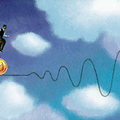OTAH, Central African Republic, March 30 — Every year, Robert Dourmadji would set aside some of his grain for seed, resisting the temptation to feed his wife and seven children with it even when times got lean as the planting season approached.
This year, though, he had no choice — his wife made porridge from the last of the millet weeks ago. They had been surviving on green mangoes and manioc leaves. Pushed from their homes in a nearby village more than three months ago by a rebellion and the scorched-earth counterinsurgency tactics of their country’s army, they have been living in desperate conditions.
“What can we do?” he said. “When the rains come we will really suffer.”
Mr. Dourmadji and hundreds of other ragged, hungry people came out of hiding Friday morning to meet John Holmes, the United Nations’ new under secretary general for humanitarian affairs, who visited the Central African Republic on the last leg of a 10-day visit to the region.
Mr. Holmes pledged more aid to help those left homeless by the fighting, now more than 210,000, and urged aid groups and donors to do more to help this nation, one of the world’s poorest and most unstable.
“They need urgent help before the harvest to make sure they have a harvest,” he said. “We aren’t doing enough. There is a bigger problem than most were aware of.”
The crisis in the Central African Republic is now more than two years old, and the fighting has killed thousands of people and caused hundreds of thousands of the country’s four million people to flee their homes.
Their flight has been so desperate that those who can have run across the border into their troubled neighbors’ territory. About 50,000 people from the northwest have fled into southern Chad, and thousands of residents of the northeastern town of Birao, in a perverse twist, have even fled into the Darfur region of Sudan, where a struggle over power, land and identity has raged since 2003.
But unlike the suffering of its neighbors, the crisis in the Central African Republic has largely escaped the world’s notice. International donors pay about $1 billion to support the effort to feed and shelter two million displaced people in Darfur. Here that figure is about $50 million, United Nations officials say.
That has meant little assistance for people left utterly destitute. Jean-Charles Dei, the top official of the World Food Program in the Central African Republic, said on a visit to Otah on Friday that his organization had no food available to feed the 1,700 people hiding here. Its operations here are chronically short of cash.
“Unfortunately, we have not had the capacity we would have liked to respond,” Mr. Dei said.
Mr. Holmes has spent the last 10 days visiting this region, which has spawned one of the world’s deadliest and most complex crises. Over the past three years, it has come to encompass three deeply troubled and unstable nations in a set of loosely connected conflicts.
In all, 2.5 million people have been forced from their homes in the three countries. In Darfur at least 200,000 people have died, and perhaps the toll is more that twice that number, though it is impossible to be sure without detailed mortality surveys. No one is sure how many have died in Chad, where the violence is linked to Darfur, or in the Central African Republic, which is a close ally of Chad’s embattled government and where diplomats and experts say rebels backed by Sudan have operated.
For more than two years a low-level, homegrown insurgency has raged in the northwestern part of this impoverished and unstable nation, and in the last year a new rebellion in the northeast has added new misery. That rebellion is suspected of having ties not only to Sudan’s government but also to rebels seeking to overthrow Chad’s government.
Mr. Holmes, who was appointed on March 1, has been seeking to highlight the enormous needs in this regional morass. He said he chose to begin his term as the United Nations’ top aid official in this region because it presented some of the biggest and most complex challenges.
“It is the biggest humanitarian operation in the world,” he said of Darfur.
Toby Lanzer, the United Nations humanitarian chief in the Central African Republic, said that despite the nation’s desperate poverty, saving lives here, with enough resources, would be relatively easy.
Chad and Sudan are vast, arid nations that have complex ethnic problems, and aid workers have been attacked and stymied by government bureaucracy. Sudan and Chad have both refused United Nations peacekeeping troops, but the Central African Republic has said it would cooperate with an international force.
“This is a place where the international community is welcomed,” Mr. Lanzer said. “It is a country of four million people. We should be able to fix this.”




